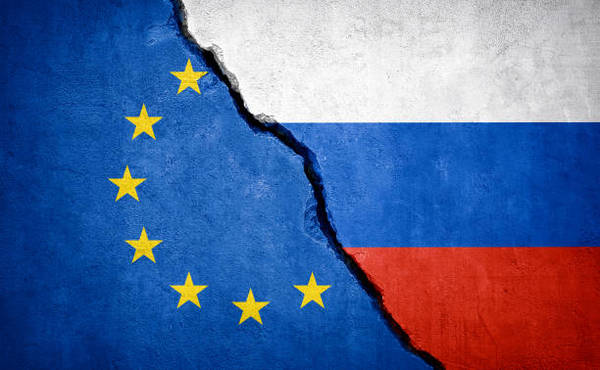Brent moves higher following the EU sanctions against Russian tankers
The European Union (EU) on Monday adopted a 14th package of economic sanctions against Russia aimed at restricting its capability to finance its war in Ukraine.
 PHOTO: Flags of the European Union and Russia. Getty Images
PHOTO: Flags of the European Union and Russia. Getty Images
The EU sanctioned 27 vessels that are allegedly a part of the Russian shadow fleet used to circumvent the price caps set on Russian crude and oil products. This news has lent some support to ICE Brent crude.
These vessels include crude oil and LNG tankers, as well as two floating gas storage units (FSU)—the Saam and the Koryak, according to Reuters. It also includes ships run by Russia’s state-owned shipping company Sovcomflot.
Brent’s price moved higher as supply concerns in the global oil market heightened as “the European Union placed sanctions on more than two dozen vessels, including 17 that hauled oil for Moscow,” ANZ Bank’s senior commodity strategist Daniel Hynes remarked.
The new measures include stricter compliance rules that support the G7 oil price cap set on Russian crude oil and other oil products, the EU Council said. These sanctions are designed to target “high-value sectors” of the Russian economy, including energy, finance, and trade, the Council noted.
The Council has targeted specific vessels that are part of Russia’s ‘dark fleet, which circumvents the EU and the G7 Price Cap Coalition’s caps.
A shadow fleet or a ‘dark fleet’ consists of older and environmentally hazardous vessels that intentionally evade regulations. These ships are said to operate under the radar by sailing without insurance or disabling their tracking transmitters. By assembling a shadow fleet of poorly maintained vessels that are used to circumvent sanctions meant to restrict the movement of Russian crude oil, Russia has effectively traded outside the imposed price cap.
Price caps on Russian crude and oil products
The price caps on Russian oil products, implemented by Washington and its allies (the G7 group of countries), are a strategic measure aimed at reducing Russia's export revenue. This limitation is intended to restrict the financial resources that Russia can allocate towards sustaining its military operations in Ukraine.
In 2022, a price cap of $60/bbl was set on crude oil originating from Russia. Following this, in 2023, two additional price caps were established on refined Russian oil products: $100/bbl for products such as diesel and gasoil, which trade at premiums to crude oil, and $45/bbl for products like fuel oil, which trade at discounts to crude oil.
By Aparupa Mazumder
Please get in touch with comments or additional info to news@engine.online





